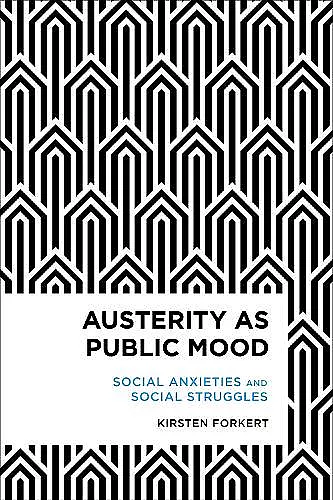Austerity as Public Mood
Social Anxieties and Social Struggles
Format:Paperback
Publisher:Rowman & Littlefield International
Published:4th Feb '19
Currently unavailable, and unfortunately no date known when it will be back
This paperback is available in another edition too:
- Hardback£115.00(9781783481934)

Austerity as Public Mood explores how politicians and the media mobilise nostalgic and socially conservative ideas of work and community in order to justify cuts to public services and create divisions between the deserving and undeserving. It examines the powerful appeal of these concepts as part of a wider public mood marked by guilt, nostalgia and resentment – particularly around the inequalities produced by global capitalism and changes to the nature of work. In doing so, the book engages with urgent questions about the contemporary political climate. Focusing on the UK, it challenges accounts of neoliberalism which frame it as primarily an individualising force and localist definitions of community as mitigating its damaging effects. Finally, it explores how resistance to austerity can challenge these tendencies by offering a politics of solidarity and hope, and a forum for experimentation with alternative forms of collectivity.
This is a wonderfully clear-sighted and necessary appraisal of how ‘austerity’ is not simply a series of policies but a cultural sensibility and public mood. Kirstin Forkert’s astute and multifaceted account simultaneously helps us understand how destructive austerity politics are garnering support whilst investigating and imagining ways they are - and could be - addressed and combated in practice. -- Jo Littler, Reader and Director of Research, Department of Sociology, City, University of London
This is an interesting and important book that helps to illuminate the particular constellation of ideas, values and practices that have marked the decade since financial crisis. Examining a range of cultural sites from ‘poverty porn’ television, to ‘inspirational’ messages, and from immigration policy to local activism against library closures, Kirsten Forkert makes a compelling case for considering austerity not only as an economic programme, nor simply an ideological position, but also as a psychosocial phenomenon built around mobilising affect to create a ‘public mood’. Thoughtful and inventive, this book will be of interest to anyone who cares about contemporary politics (in Britain). -- Rosalind Gill, Professor of Cultural and Social Analysis at City, University of London
The notion of austerity as mood is compelling. It helps explain how policies injurious to both the working and middle classes have come not only to seem acceptable but ‘right’, how these notions have come to shape thinking not just in macro-economic management but in the daily lives of citizens. [Kirsten Forkert’s] focus on resistance is to be applauded. Unlike much work on neoliberalism, her focus on resistance feels like more than a postscript or an afterthought. She attends to the challenges of resisting amongst this mood of austerity—the ways in which austerity thinking changes logic, alters the rationality of those resisting to accept or settle for compromises that are far from ideal. * Emotion, Space and Society, 23 May 2018 *
Kirsten Forkert’s Austerity as Public Mood: Social Anxieties and Social Struggles makes a significant contribution to the recent cultural political project of understanding austerity and its effects as embodied and emotional.… Austerity as Public Mood: Social Anxieties and Social Struggles is a rich tapestry of the multiple threads that combine to produce austerity as a lived and felt phenomenon. Forkert artfully disentangles these threads to make clear the cultural and political processes involved in the construction of the present atmosphere. In doing so, the book contributes to the wider wave of recent work that explores the affective and cultural dimensions of economic and social realities. * Cultural Politics, Vol. 14, No. 3 *
ISBN: 9781783481941
Dimensions: 221mm x 149mm x 17mm
Weight: 349g
228 pages